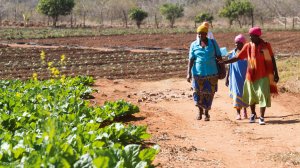While significant growth is forecast for five African countries that form part of the top-ten biggest growing economies in the world, this is not the case for South Africa.
Speaking at the Frontier Advisory’s Africa Outlook 2015 forum, CEO Martyn Davies pointed out that the Democratic Republic of Congo, Cote d’Ivoire, Congo, Mozambique and Tanzania would double their growth domestic product (GDP) in less than ten years. In contrast, South Africa, at its current growth rate, would take almost 50 years to double its economy.
He also noted that by 2025, Nigeria’s GDP would be $1-trillion strong, with a projected 6.97% actual growth; Ethiopia would be a $100-billion economy by 2021, with a projected growth rate of 8.20%, while Ghana and Kenya, with actual growth rates projected at 4.47% and 5.34%, respectively, would have GDPs of $100-billion by 2027.
South Africa’s projected actual growth rate sat at a meagre 1.4%. “If every country could reach 7%, they would effectively double their GDP every ten years. This is why speed of growth matters,” Davies noted.
Meanwhile, he identified a number of key emerging themes for the year ahead, which included commodity price declines, unabated consumer spending, lingering impacts from the Ebola crisis, currencies being placed under pressure in light of fiscal concerns and the strong dollar, and China announcing further multibillion-dollar investments into Africa.
Davies highlighted that the continuing trend of militant/terrorist activity in West Africa was a problem that needed to be solved, citing “religious fault lines” as an ultimate challenge for the continent. Meanwhile piracy had cleared up on the coast of Somalia, but it was now migrating to the west coast, with the Gulf of Guinea being a target.
He hinted that these problems could be resolved through political will. “There are a number of big elections coming up this year. Nigeria arguably, as many countries do, needs better governance, better economic management, better political management and, ultimately, inclusive growth.”
Paired with this, Davies pointed out that there was a significant shift in investment interest from West Africa to East Africa – away from commodities driven economies that exported nonprocessed single commodities to “real economies that actually generate value”.
The power crisis in South Africa would also be a key theme for the year ahead and would have a negative knock-on impact on regional GDP growth. “South Africa’s growth is lacklustre, and Eskom is not [helping],” International Monetary Fund South Africa senior resident representative Dr Axel Schimmelpfenning said.
Davies echoed this sentiment, stating that despite China’s growth “cooling off” and the multibillion-dollar investments it was making in Africa, the Asian country was still spending 48% – “its all time low” – of its GDP on infrastructure, while South Africa, equal to Brazil, was only spending 18%.
Meanwhile, Schimmelpfenning explained that there would be other significant trends that would guide the year ahead.
These included continued strong growth in a majority of countries, paired with infrastructure and economic activity facing headwinds, as “a rising tide does not lift all boats equally,” Davies added.
“The bottom line is that we are still fairly positive on the growth front. The main challenge is sustaining growth, but making it more inclusive,” Schimmelpfenning concluded.
EMAIL THIS ARTICLE SAVE THIS ARTICLE FEEDBACK
To subscribe email subscriptions@creamermedia.co.za or click here
To advertise email advertising@creamermedia.co.za or click here










